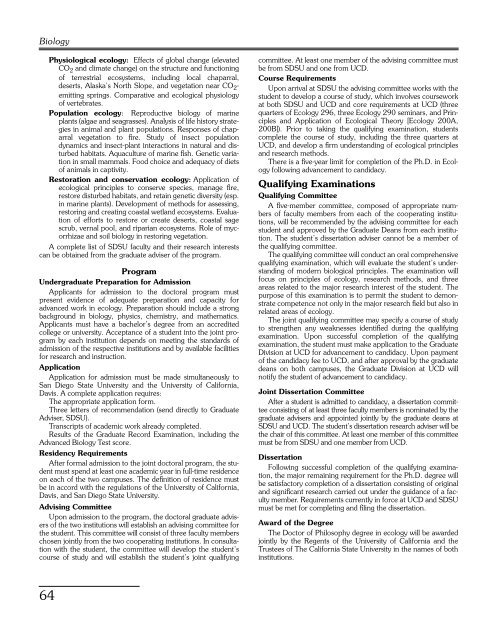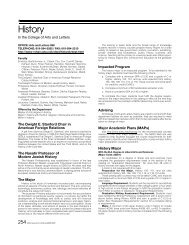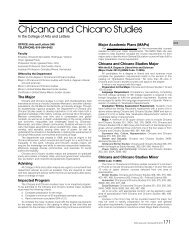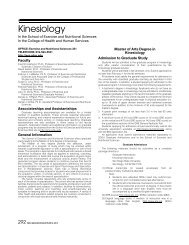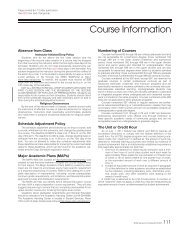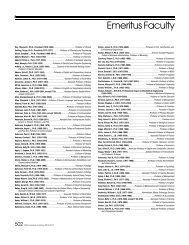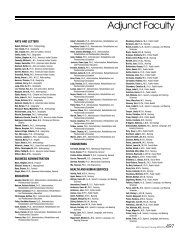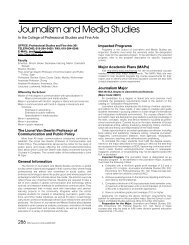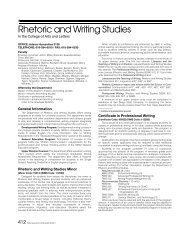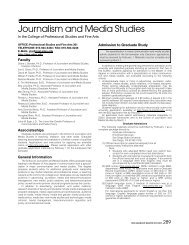President Stephen L. Weber - San Diego State University ...
President Stephen L. Weber - San Diego State University ...
President Stephen L. Weber - San Diego State University ...
Create successful ePaper yourself
Turn your PDF publications into a flip-book with our unique Google optimized e-Paper software.
Biology<br />
Physiological ecology: Effects of global change (elevated<br />
CO2 and climate change) on the structure and functioning<br />
of terrestrial ecosystems, including local chaparral,<br />
deserts, Alaska’s North Slope, and vegetation near CO2 emitting springs. Comparative and ecological physiology<br />
of vertebrates.<br />
Population ecology: Reproductive biology of marine<br />
plants (algae and seagrasses). Analysis of life history strategies<br />
in animal and plant populations. Responses of chaparral<br />
vegetation to fire. Study of insect population<br />
dynamics and insect-plant interactions in natural and disturbed<br />
habitats. Aquaculture of marine fish. Genetic variation<br />
in small mammals. Food choice and adequacy of diets<br />
of animals in captivity.<br />
Restoration and conservation ecology: Application of<br />
ecological principles to conserve species, manage fire,<br />
restore disturbed habitats, and retain genetic diversity (esp.<br />
in marine plants). Development of methods for assessing,<br />
restoring and creating coastal wetland ecosystems. Evaluation<br />
of efforts to restore or create deserts, coastal sage<br />
scrub, vernal pool, and riparian ecosystems. Role of mycorrhizae<br />
and soil biology in restoring vegetation.<br />
A complete list of SDSU faculty and their research interests<br />
can be obtained from the graduate adviser of the program.<br />
Program<br />
Undergraduate Preparation for Admission<br />
Applicants for admission to the doctoral program must<br />
present evidence of adequate preparation and capacity for<br />
advanced work in ecology. Preparation should include a strong<br />
background in biology, physics, chemistry, and mathematics.<br />
Applicants must have a bachelor’s degree from an accredited<br />
college or university. Acceptance of a student into the joint program<br />
by each institution depends on meeting the standards of<br />
admission of the respective institutions and by available facilities<br />
for research and instruction.<br />
Application<br />
Application for admission must be made simultaneously to<br />
<strong>San</strong> <strong>Diego</strong> <strong>State</strong> <strong>University</strong> and the <strong>University</strong> of California,<br />
Davis. A complete application requires:<br />
The appropriate application form.<br />
Three letters of recommendation (send directly to Graduate<br />
Adviser, SDSU).<br />
Transcripts of academic work already completed.<br />
Results of the Graduate Record Examination, including the<br />
Advanced Biology Test score.<br />
Residency Requirements<br />
After formal admission to the joint doctoral program, the student<br />
must spend at least one academic year in full-time residence<br />
on each of the two campuses. The definition of residence must<br />
be in accord with the regulations of the <strong>University</strong> of California,<br />
Davis, and <strong>San</strong> <strong>Diego</strong> <strong>State</strong> <strong>University</strong>.<br />
Advising Committee<br />
Upon admission to the program, the doctoral graduate advisers<br />
of the two institutions will establish an advising committee for<br />
the student. This committee will consist of three faculty members<br />
chosen jointly from the two cooperating institutions. In consultation<br />
with the student, the committee will develop the student’s<br />
course of study and will establish the student’s joint qualifying<br />
64<br />
committee. At least one member of the advising committee must<br />
be from SDSU and one from UCD.<br />
Course Requirements<br />
Upon arrival at SDSU the advising committee works with the<br />
student to develop a course of study, which involves coursework<br />
at both SDSU and UCD and core requirements at UCD (three<br />
quarters of Ecology 296, three Ecology 290 seminars, and Principles<br />
and Application of Ecological Theory [Ecology 200A,<br />
200B]). Prior to taking the qualifying examination, students<br />
complete the course of study, including the three quarters at<br />
UCD, and develop a firm understanding of ecological principles<br />
and research methods.<br />
There is a five-year limit for completion of the Ph.D. in Ecology<br />
following advancement to candidacy.<br />
Qualifying Examinations<br />
Qualifying Committee<br />
A five-member committee, composed of appropriate numbers<br />
of faculty members from each of the cooperating institutions,<br />
will be recommended by the advising committee for each<br />
student and approved by the Graduate Deans from each institution.<br />
The student’s dissertation adviser cannot be a member of<br />
the qualifying committee.<br />
The qualifying committee will conduct an oral comprehensive<br />
qualifying examination, which will evaluate the student’s understanding<br />
of modern biological principles. The examination will<br />
focus on principles of ecology, research methods, and three<br />
areas related to the major research interest of the student. The<br />
purpose of this examination is to permit the student to demonstrate<br />
competence not only in the major research field but also in<br />
related areas of ecology.<br />
The joint qualifying committee may specify a course of study<br />
to strengthen any weaknesses identified during the qualifying<br />
examination. Upon successful completion of the qualifying<br />
examination, the student must make application to the Graduate<br />
Division at UCD for advancement to candidacy. Upon payment<br />
of the candidacy fee to UCD, and after approval by the graduate<br />
deans on both campuses, the Graduate Division at UCD will<br />
notify the student of advancement to candidacy.<br />
Joint Dissertation Committee<br />
After a student is admitted to candidacy, a dissertation committee<br />
consisting of at least three faculty members is nominated by the<br />
graduate advisers and appointed jointly by the graduate deans at<br />
SDSU and UCD. The student’s dissertation research adviser will be<br />
the chair of this committee. At least one member of this committee<br />
must be from SDSU and one member from UCD.<br />
Dissertation<br />
Following successful completion of the qualifying examination,<br />
the major remaining requirement for the Ph.D. degree will<br />
be satisfactory completion of a dissertation consisting of original<br />
and significant research carried out under the guidance of a faculty<br />
member. Requirements currently in force at UCD and SDSU<br />
must be met for completing and filing the dissertation.<br />
Award of the Degree<br />
The Doctor of Philosophy degree in ecology will be awarded<br />
jointly by the Regents of the <strong>University</strong> of California and the<br />
Trustees of The California <strong>State</strong> <strong>University</strong> in the names of both<br />
institutions.


